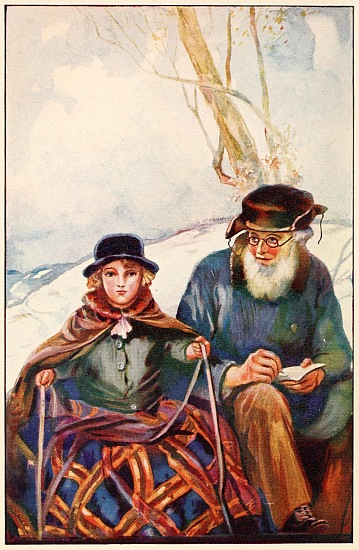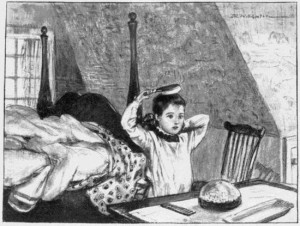There was Elizabeth Ann alone with her much-feared Great-uncle Henry.
She sat very still on the high lumber seat, feeling very forlorn and neglected. She felt herself to be in the most dangerous place she had ever dreamed of in her worst dreams. Oh, why wasn’t Aunt Frances there to take care of her! She looked up at Uncle Henry with the wild eyes of nervous terror which always brought Aunt Frances to her in a rush to “hear all about it,” to sympathize, to reassure.
Uncle Henry looked down at her soberly, his hard, weather-beaten old face quite unmoved. “Here, you drive, will you, for a piece?” he said briefly, putting the reins into her hands… “I’ve got some figgering to do. You pull on the left-hand rein to make ’em go to the left and t’other way for t’other way, though ’tain’t likely we’ll meet any teams.”
Elizabeth Ann had been so near one of her wild screams of terror that now, in spite of her instant absorbed interest in the reins, she gave a queer little yelp. But Uncle Henry seemed not to have heard her little howl, or, if he had, didn’t think it worth conversation..
Elizabeth Ann drew a long breath….Oh, there they were going to the left!…in her flurry, she made a mistake about which hand was which and pulled wildly on the left line! The horses docilely walked off the road into a shallow ditch, the wagon tilted…help! Why didn’t Uncle Henry help!
Elizabeth Ann, the perspiration starting out on her forehead, pulled on the other line. But she must think of some way to remember, for sure, which her right hand was, and avoid that hideous mistake again.
And then suddenly something inside Elizabeth Ann’s head stirred and moved. It came to her, like a clap, that she needn’t know which was right or left at all. If she just pulled the way she wanted them to go–the horses would never know whether it was the right or the left rein!
It was possible that what stirred inside her head at that moment was her brain, waking up. She was nine years old, and she was in the third A grade at school, but that was the first time she had ever had a whole thought of her very own. At home, Aunt Frances had always known exactly what she was doing, and had helped her over the hard places before she even knew they were there; and at school her teachers and been carefully trained to think faster than the scholars. Somebody had always been explaining things to Elizabeth Ann so industriously that she had never found out a single thing for herself before. This was a very small discovery, but an original one. Elizabeth Ann was as excited about it as a mother-bird over the first egg that hatches.
She forgot how afraid she was of Uncle Henry, and poured out to him her discovery. When she finished–”Well, now, that’s so,” he admitted, and returned to his arithmetic.
It was a short remark, shorter than any Elizabeth Ann had ever heard before. Aunt Frances and her teachers always explained matters at length. But it had a weighty, satisfying ring to it. The little girl felt the importance of having her statement recognized. She turned back to her driving.
The slow, heavy plow horses had stopped during her talk with Uncle Henry. They stood as still now as though their feet had grown to the road. Elizabeth Ann looked up at the old man for instructions. But he was deep in his figures… so she sat still and waited for him to tell her what to do.
The early winter twilight was beginning to fall, and she felt rather empty. She grew very tired of waiting, and remembered how the grocer’s boy at home had started his horse. Then, summoning all her courage, with an apprehensive glance at Uncle Henry’s arithmetical silence, she slapped the reins up and down on the horses’ backs and made the best imitation she could of the grocer’s boy’s cluck. The horses lifted their heads, they leaned forward, they put one foot before the other…they were off! The color rose hot on Elizabeth Ann’s happy face. If she had started a big red automobile she would not have been prouder. For it was the first thing she had ever done all by herself…every bit…every smitch! She had thought of it and she had done it. And it had worked! (from Understood Betsy)
This little snippet from a wonderful book is all that needs to be said on the importance and value of standing back and letting children learn on their own. There will be mistakes, ruined projects, imperfect crafts, cookies that crumble; but learning to do things for yourself, figuring it out, builds confidence and trust in oneself. Don’t help too much or too soon. Just be present and watch!
Possibly Related Posts:
- Self Care for Better Parenting – Part 2
- Self Care for Better Parenting – Part 1
- Got Kids 24/7 – 2 Tips to make life easier
- The Screen Free Experiment
- 5 Tips to Put Family first





{ 1 comment… read it below or add one }
These are two beautiful examples of how we should let children learn from mistakes.The perfectionist adults including me have an attitude of interfering when we get the slightest clue that the child is going to make a mistake.And we keep them from learning a great new lesson.